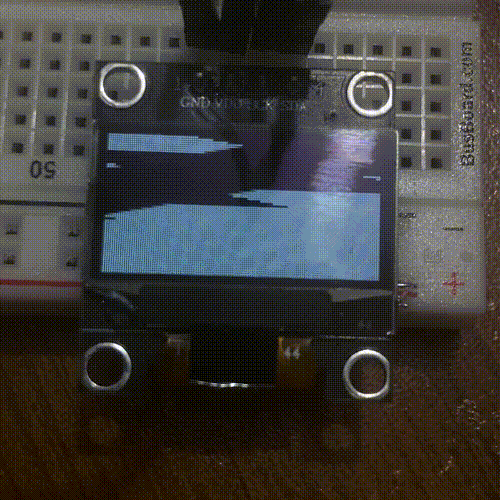C vs. Ruby+YJIT: I2C Edition
I recently added a bit-bang I2C implementation to the lgpio gem.
“Bit banging” means you don’t use the I2C hardware built into the SBC. Instead, you manipulate a pair of regular GPIO, as fast as you can, to mimic what the hardware does.
This sounds like a bad idea. Why would you even do it? One use is if you need multiples of a device (eg. 4 of the same sensor) but they all have the same I2C address. Devices with the same address can’t coexist on a bus, so you need more buses (or a multiplexer, but that’s another post).
How Bad Is It?
As a benchmark for I2C performance, I’ve been using a script that repeatedly fills and clears all the pixels of a 1” SSD1306 OLED, as fast as possible. It looks like this when running:

Performance is pretty good. On a Raspberry Pi 4, it does about 85% of what the hardware bus (at 400 kHz) can do, consuming a CPU core in the process. Hardware I2C doesn’t use the CPU.
This is an extreme case, and it’s moving upward of 300kbps here, which is a decent rate for I2C. Less demanding applications use proportionately less CPU, and work just fine.
But Can We Make It Worse?
My implementation was written in C, as the gem is mostly Ruby bindings for the lgpio C library.
After seeing this talk by Maxime Chevalier-Boisvert, where she shows that Ruby+YJIT can sometimes even outperform C extensions, I wondered if that might apply here.
We can’t avoid calling C, a lot, to change GPIO levels , and YJIT can’t optimze that. But bit-banging also involves arrays, loops, enumerators, bitwise operations, and other fun stuff. Surely it can optimize something.
Ruby Implementation
To test this theory, I rewrote my original C implementation as closely as I could in Ruby. Both implementations are in the gem, and usable… for now.
The “C implementation” takes an array from Ruby, and handles all the “bit-bang logic” in C. On the other hand, the “Ruby implementation” does as much as possible in Ruby: enumerate through the array, get individual bits etc., only calling C to change GPIO levels.
Benchmarks
I created 2 benchmark scripts in the gem’s examples folder:
Apart from which bit-bang implementation they call, they both do the same thing: initialize the OLED, start timing, send 400 frames to it (alternating between filled and emtpy), stop timing. Finally, they calculate and print the number of frames per second (fps) achieved.
Test Setup
- Raspberry PI 4B 8GB, with enclosure, heatsink and fan
- CPU frequency fixed at 1800 MHz
- Raspberry Pi OS
- Kernel 6.6.47-v8+
- Rust 1.81.0
- Ruby+YJIT 3.3.5 (installed via rbenv + ruby-build)
- SCL on GPIO 5
- SDA on GPIO 6
- Only device connected to the I2C bus is the SSD 1306 OLED
- Each implementation was tested twice, with and without
--yjit - Each test consisted of 6 repeated runs, done consecutively
- For each test, only the 3 highest results were taken
Results
Results in frames per second (fps). Higher is better.
# C implementation
ruby examples/i2c_bitbang_ssd1306_bench.rb
# Results: 36.78, 35.78, 35.69 | Average: 36.08 fps
# C implementation + YJIT
ruby --yjit examples/i2c_bitbang_ssd1306_bench.rb
# Results: 36.77, 36.72, 36.21 | Average: 36.57 fps
# Ruby implementation
ruby examples/i2c_bitbang-rb_ssd1306_bench.rb
# Results: 25.99, 25.53, 24.99 | Average: 25.50 fps
# Ruby implementation + YJIT
ruby --yjit examples/i2c_bitbang-rb_ssd1306_bench.rb
# Results: 33.42, 32.76, 32.42 | Average: 32.87 fps
Conclusion
- As expected, YJIT only improves the C implementation by about 1.0 %
- Ruby+YJIT is 28.9 % faster than plain Ruby
- Plain Ruby is only 70.7 % as fast as C
- Ruby+YJIT is 89.9 % as fast as the best C test
This is an impressive result, especially since we simply can’t avoid a ton of C calls. No, the YJIT gain isn’t multiples, like one of the examples in Maxime’s talk, but who cares?
The Ruby performance is getting close to C.
Given how much easier the Ruby code is to read and work with, I’m considering removing the C implementation entirely. Maybe 3.4 will even bring the Ruby version up to par? Either way, bit-bang SPI will be Ruby-first when I get around to it.
